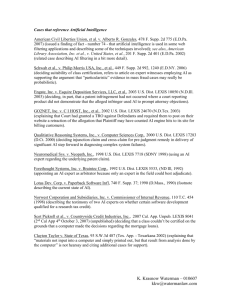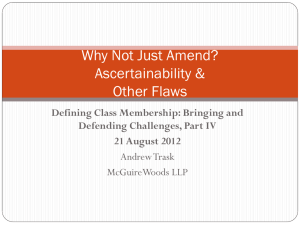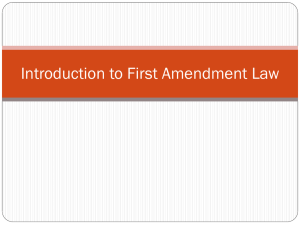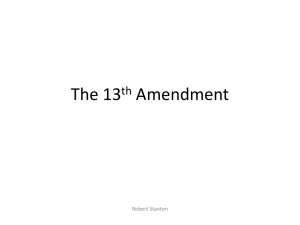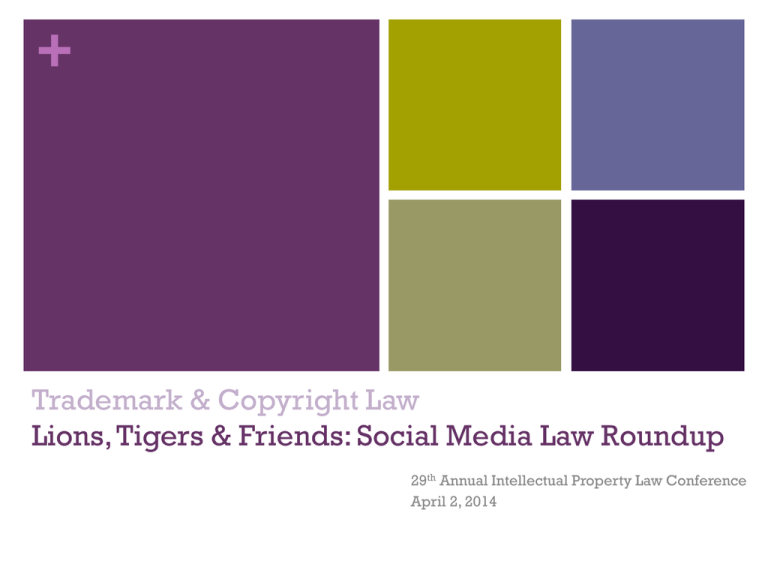
+
Trademark & Copyright Law
Lions, Tigers & Friends: Social Media Law Roundup
29th Annual Intellectual Property Law Conference
April 2, 2014
+
Today’s Discussion: Panel
Hannah Poteat
Poteat Law
Jennifer Criss
Drinker Biddle & Reath, LLP
Ganka Hadjipetrova
Hadjipetrova Law
Perry Sofferman
Becker & Poliakoff, P.A.
+
Today’s Discussion: Issues
Personal Jurisdiction Over Social Media Users
Social Media and Discovery in Civil Litigation
Litigating Privacy Policies
Social Media and the First Amendment
Impersonation and Social Media
+
Personal Jurisdiction Over
Social Media Users
+
Personal Jurisdiction
Intercarrier Communs., LLC v. Kik Interactive, Inc., No.
3:12‐CV‐771‐JAG, 2013 U.S. Dist. LEXIS 112715 (E.D. VA Aug. 9, 2013)
“A company does not ‘consciously’ or ‘deliberately’ target a forum
if a user unilaterally downloads and uses its software within that
forum, nor does ICC cite any authority supporting its broad
interpretation of specific jurisdiction.”
+
Personal Jurisdiction
Harp v. Koury, No. 13‐2470, 2013 U.S. Dist. LEXIS 117785 (E.D. PA Aug.
15, 2013)
Court tested possibility of finding specific jurisdiction under the
Calder “effects” doctrine.
Finding that the defendant did not know that the plaintiff would
suffer the brunt of the harm in the forum, i.e. the defendant had
not “expressly aimed” the tortious conduct at the forum, state the
Court dismissed the case for lack of personal jurisdiction.
+
Personal Jurisdiction
Hyperbaric Options, LLC v. Oxy‐Health, LLC, No. 12‐12020, 2013 U.S. Dist.
LEXIS 140347 (E.D. MI Sept. 30, 2013)
Court followed Sixth Circuit’s narrowed approach to the Calder
“effects” test, noting that “something more” is required to
demonstrate that the defendant directed its activity toward the forum
state. The Court refused to establish personal jurisdiction despite the
defendant’s knowledge that the plaintiff would suffer the brunt of the
harm in the forum state.
+
Personal Jurisdiction
NobelBiz, Inc. v. Veracity Networks, LLC, No. 13‐CV‐2518 YGR, 2013 U.S.
Dist. LEXIS 139709 (N.D. CA Sept. 27, 2013)
Court said that Veracity’s mere presence on social media sites did
not, without more, support an inference that it seeks nationwide
sales.
+
Personal Jurisdiction
Caspers Ice Cream, Inc. v. Fatboy Cookie Co., No. 1:12-CV-133, 2013
U.S. Dist. LEXIS 76058 (D. UT May 29, 2013)
Court said that the accessibility of New Jersey company’s website
and social media in Utah was not a sufficient contact for Fatboy to
anticipate it would be subject to suit in that state.
+
Social Media and Discovery
in Civil Litigation
+
Discovery
Keller v. Nat’l Farmers Union Prop. & Cas. Co., No. C‐12‐72‐M‐DLC‐JCL,
2013 U.S. Dist. LEXIS 452 (D. Mont. Jan. 2, 2013)
Court applied threshold test whereby discovery of a plaintiff’s
private social networking site content is only permissible when
the defendant makes a “threshold showing that publicly available
information on those sites undermines the plaintiff’s claims.”
+
Discovery
Salvato v. Miley, No. 5:12-cv‐635‐Oc‐10PRL, 2013 U.S. Dist. LEXIS
81784 (M.D. Fl. June 11, 2013)
Court applied threshold test where a party “may obtain discovery
on any nonprivileged matter that is relevant to any part’s claim or
defense” if it meets the threshold burden of showing that the
requested discovery is relevant.
+
Discovery
Jewell v. Aaron’s, Inc., No. 1:12‐cv‐0563‐AT, 2013 U.S. Dist. LEXIS
102182 (N.D. Ga. July 19, 2013)
In this class action the Court held that a single individual’s (the
named plaintiff’s) post on a social media site has no bearing on
whether all 87 plaintiffs had received a bona fide meal period as
required under federal law.
+
Discovery
Giacchetto v. Patchogue‐Medford Union Free Sch. Dist., 293 F.R.D. 112
(E.D.N.Y. 2013)
The court opted not to apply the threshold test to determine
whether the school district was entitled to discovery of any
private social networking posts. Instead, the court conducted a
traditional relevance analysis.
The court did not require Giacchetto to provide routine status
updates but did require her to produce any specific references to
emotional distress suffered as a result of any source of stress, not
just the incident at issue.
+
Litigating Privacy Policies
+
Litigating Privacy Policies
Harris v. comScore, 825 F. Supp. 2d 924 (N.D. Ill. 2011)
Court held that “a click-through agreement is not enforceable if
its terms are not reasonably apparent to the user” and that “it is
not reasonable to expect a user casually downloading free
software to search for such an agreement if it is not immediately
available and obvious where to obtain it.”
+
Litigating Privacy Policies
FTC v. Wyndham Hotels and FTC v. LabMD
The FTC brought actions against Wyndham and LabMD,
respectively, under its Section 5 authority for unfair and deceptive
practices for data breaches.
+
Litigating Privacy Policies
In re Google Inc. Gmail Litigation, Case No.: 13‐MD‐02430‐LHK, 2013
U.S. Dist. LEXIS 172784 (N.D. CA Sept. 26, 2013)
Plaintiffs from several states brought suit against Google for
targeted advertising that appears on Gmail users’ pages in
violation of privacy laws.
+
Social Media and the First
Amendment
+
Legislation Restricting or Banning
Use of Social Networks by
Registered Sex Offenders
California
Nevada
Delaware
New Hampshire
Georgia
New Jersey
Indiana
New York
Louisiana
North Carolina
Michigan
Utah
Nebraska
Wisconsin
+
Legislation: Provisions (generally)
Require disclosure of Internet identifying information
Internet restrictions (e.g., no use of social media)
Provide consent to search computer or device
Monitoring of Internet use
+
Challenges
First Amendment
Fourth Amendment
Ex Post Facto
Fourteenth Amendment
Supremacy Clause
+
First Amendment Analysis
Content based: strict scrutiny
Content neutral: intermediate scrutiny
Prior restraint?
+
Content Neutral
Invalidated as insufficiently narrowly tailored
Failing to leave open alternative channels of communication
Disclosure of Internet identification: violation of one’s right to
maintain anonymous speech
+
Key Issues
Parole
Supervised release
Civil, non-punitive
+
First Amendment
John Doe, et al. v. State of Nebraska, 898 F. Supp.2d 1086 (D. Neb. 2012)
Case examined a statute that criminalized registered sex
offenders’ use of social networking sites
Cases raises First Amendment, Due Process, Ex Post Facto and
Fourth Amendment issues
+
First Amendment
J.B v. New Jersey State Parole Board, 433 N.J. Super. 327 (2013)
Court held that statute and regulations authorizing internet
restrictions to be imposed on offenders did not facially violate
offenders’ free speech rights
+
First Amendment
Perez v. Dietz Development, LLC, No. 122157, 2012 Va. LEXIS 227 (VA
Dec. 28, 2012)
Case involving critical reviews of contractor on Yelp and Angie’s
List that included customer’s suspicion that contractor stole
jewelry from plaintiff’s house.
State court issued preliminary injunction but Virginia Supreme
Court reversed for unspecified duration and availability of
other remedies at law.
+
First Amendment
Yelp, Inc. v. Hadeed Carpet Cleaning, Inc., 62 Va.App. 678, 752 S.E.2d
554 (Ct. App.VA 2014)
Case involves the balance between the right to free speech by
anonymous publishers and businesses’ interest to protect their
reputation from defamatory statements.
The state court ordered Yelp to reveal the identities of 8 negative
reviewers of the plaintiff’s business. Yelp refused and was held in
contempt; the court of appeals affirmed.
Yelp appealed before the VA supreme court in February;
decision is pending
+
First Amendment
Gordon & Holmes v. Love, No. BC462438 (Superior Court of Los
Angeles County, California)
Attorney sought $8 million in damages against former client,
Courtney Love, for an allegedly libelous Tweet (Love suggested
that Holmes had been “bought off” in the case against the
administrators of Kurt Cobain’s estate)
Jury found that Love’s tweet was not libelous
Love said that it was intended as a private message and that she
deleted the Tweet immediately upon realizing it was published
publicly
+
Impersonation and Social
Media
+
E-Impersonation
As of June 2012, approximately 83 million of 955 million Facebook
profiles were fake
Assist in gathering intelligence
Cyberbullying
Fraud
False endorsement
Scraping
+
Computer Fraud and Abuse Act
18 U.S.C. §1030
Criminal cybersecurity law that protects federal government
computers, financial institution computers, and other computers
connected to the Internet from trespass, threats, damage, spying,
and being used for purposes of fraud
Interstate or foreign commerce or communication
Conspiracy and attempt to commit are subject to same criminal
penalties as the offense itself
Also provides for a private right of action
+
Key Issues
Protected Computer?
A computer used by a financial institution or the U.S. government,
or a computer used in or affecting interstate or foreign commerce
or communication, including a computer located outside the U.S.
Exceeds authorized access?
Accessing a computer with authorization and using this access to
obtain or alter information in the computer that the accessing
party is not entitled to obtain or alter
+
Key Issues (continued)
It is a crime to “intentionally” access a protected computer without
authorization and as a result cause damage and loss
“Damage” is an impairment to the integrity or availability of data, a
computer program, system or information
“Loss” is a “reasonable cost” to a victim, including the cost of
responding to an offense, conducting a damage assessment,
restoring data, programs, systems, or information to its condition
prior to the offense, and revenue lost, costs incurred, or other
consequential damages incurred because of interruption of service
+
E-Impersonation
Consider in context of United States v. Lori Drew, No. CR 08-0582-GW
(C.D. Cal. Aug. 28, 2009)
Matot v. CH, No. 13‐cv‐153‐TC, 2013 U.S. Dist. LEXIS 138327 (D. Or. Sept.
26, 2013)
Case involving middle school assistant principal’s claim alleging that
the creation of social media accounts under his name by students
violates the Computer Fraud and Abuse Act
+
Hannah Poteat
hpoteat@poteatlaw.com
415.967.3690
Jennifer Criss
jennifer.criss@dbr.com
202.230.5648
Lions, Tigers & Friends:
Social Media Law Roundup
Ganka Hadjipetrova
ganka@hadjipetrovalaw.com
408.910.0390
Perry Sofferman
psofferman@bplegal.com
954.364.6021
Thank You!

